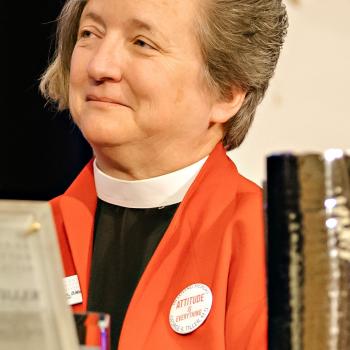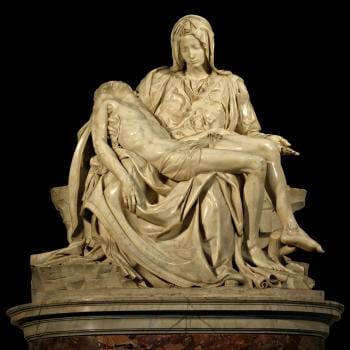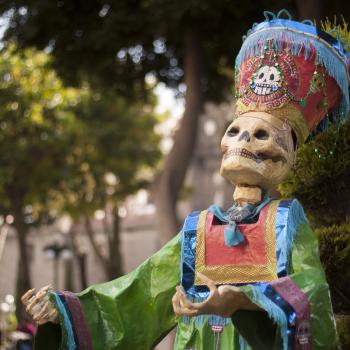I can speak from experience. I was a celibate Anglican priest for seven years. Then I got married. I was a married Anglican priest for three years. Then we joined the Catholic church. I was in the married state as a layman for ten years. Now I am a married Catholic priest and have been for six years.
This week the question of mandatory celibacy for Catholic priests is in the news again. The question is a real one–especially in light of the most recent scandal involving Cardinal O’Brien of Scotland. One of the most vociferous voices opposed to same sex marriage, it turns out that he had a few homosexual adventures of his own in his younger years. Repeatedly we have heard rumors and whisperings of the sexual crimes and misdemeanors of clergy who have taken a vow of celibacy and then fallen off the chastity wagon.
Is celibacy the problem? Would the sexual scandals be solved if priests were allowed to marry? We have to stop, take a deep breath and think it through with common sense. First of all, celibacy in and of itself doesn’t necessarily cause a person to run out and commit a sexual crime. One only has to check out sexual offenders. Many of them are married men, some are sexually promiscuous, some are using prostitutes. Sex crimes are more likely to be committed by the sexually active than they are by the celibate. Therefore, we can conclude that celibacy (not being engaged in sexual relations with anyone) is not the cause of sexual crimes and misbehaviors.
In addition to this argument is the fact that a huge number of men and women, for many different reasons, are sexually inactive. It is not just celibate Catholic priests who are not having sexual relations on a regular basis. Many single people are not involved in sexual activity. Many older people are not involved in sexual activity. Members of certain professions which involve solitude or separation from their spouse are not involved in sexual activity. These other people who are not sexually active are not immediately and insatiably involved in sex crimes. Therefore we can conclude that celibacy in and of itself does not cause sexual crimes and misdemeanors.
What does cause people to fall off the chastity wagon? It’s quite simple: the need for love. People need to be loved and give love. It’s a basic requirement. You can’t live life without it. The point of life is to learn the difficult lessons of love.
The kink in human nature is that this need to love and be loved gets twisted in all sorts of ways. The need to love and be loved can turn towards oneself and a person is locked into a sad and solitary existence of sexual fantasy, pornography and masturbation. The need to love and be loved can be turned (for many complex reasons) to members of the same sex–sometimes temporarily, sometimes permanently. The need to love and be loved can be twisted into other perversions–to pedophilia, bestiality, sado masochism and other distorted and horrific attempts to feed the very basic and fundamental “love hunger.”
People long for love and search for it in sexual intimacy. The problem is that sexual intimacy on its own does not satisfy the love hunger. That’s why sexually active people are not necessarily satisfied. Sexual pleasure on its own does not equal love. The virtue of chastity–which is the discipline of the sexual appetites in order to attain true love–is the demand for men and women to rise above mere sexual gratification to discover a lasting, permanent and satisfying love.
This is the challenge and witness of celibacy–to learn how to love without sexual expression, and to show that there is a love which is above and beyond sexual intimacy. Why should this be an important aspect of the spiritual life? It is not only Catholic priests, monks and nuns who are expected to be celibate. Celibacy, at least for a time, is expected of devotees of other religions as well. Celibacy is a discipline which directs the sexual appetites toward their true fulfillment–which is the a consummation into Love itself–a Love which is higher and more eternal than mere sexual expression.
That it is difficult to attain this sort of spiritual union with Love itself is an understatement. It is the spiritual equivalent of climbing Mt Everest. That some fail (and fail disastrously) in this high and noble calling is to be expected. Not everyone who sets out to climb Everest make the summit. Some fail and turn back. Some freeze to death alone and lost. Some tumble over cliffs or plunge into a crevasse. Others are swept away by an avalanche.
The extreme challenge of celibacy can only be won as the individual learns how to understand and accept his or her own sexuality, and learn through prayer, self discipline and the love of others through service and community how to ascend to that higher Love to which we are all called. Furthermore, this calling to rise to the higher form of love is not only the call of the celibate. Each one of the baptized are called to ascend to the higher form of Love and be united with that Eternal Love through the virtue of chastity.
While the celibate seeks this higher form of Love by foregoing sexual intimacy completely, the married are expected to seek the high form of Love through the sacrament of marriage and the union between a man and woman for life. In a culture where everyone is expected to be copulating most of the time, we seem to forget that the Christian ideal of sexuality is one of chastity–where all men and women–no matter what their state in life–if they are not married–are expected to be celibate. We also seem to forget that even within marriage sexual activity is meant to be constrained and disciplined. The sexual act is not meant–even in marriage–only for non stop recreation and pleasure. It is designed and directed towards the procreation of children as well as the fulfillment and solidarity of the marriage. All sexual activity is not permitted for married people, and just because a person is married does not mean that he or she may indulge in a sexual free for all.
In other words, the celibate priest, monk, brother or sister is a reminder to all Catholics that there are limits to sexual activity, and that all are called to chastity. All are called, if they are unmarried, to celibacy. All are called universally, to rise beyond the love of human sexuality to the Divine Love which is above all and in all and through all and which is infused into and through human sexuality. All are called to sublimate the sexual urge and direct it toward this higher and more eternal form of love.
This is what Love IS. It is finally being called and drawn into the Divine Love. This happens through the rationalization and integration of our sexuality–no matter how that sexuality is experienced. If this is what Love is, then Lust is anything which is directed away from this ultimate divine love back to what is below–back to “love” which is merely genital stimulation of some sort–back to a “love” which is centered on self pleasure and mere physical delight. Lust is the distortion, degradation and denigration of Love.
Celibacy, therefore, is not the enemy of true love, but it’s friend and ally. We should not be surprised when people fail in this high calling, but their failure does not mean that we forsake the goal or abandon the ideal. Their failure should encourage us all the more to reach forward to that high calling to be conformed fully to the image of Christ–who is the Divine Love incarnate.











